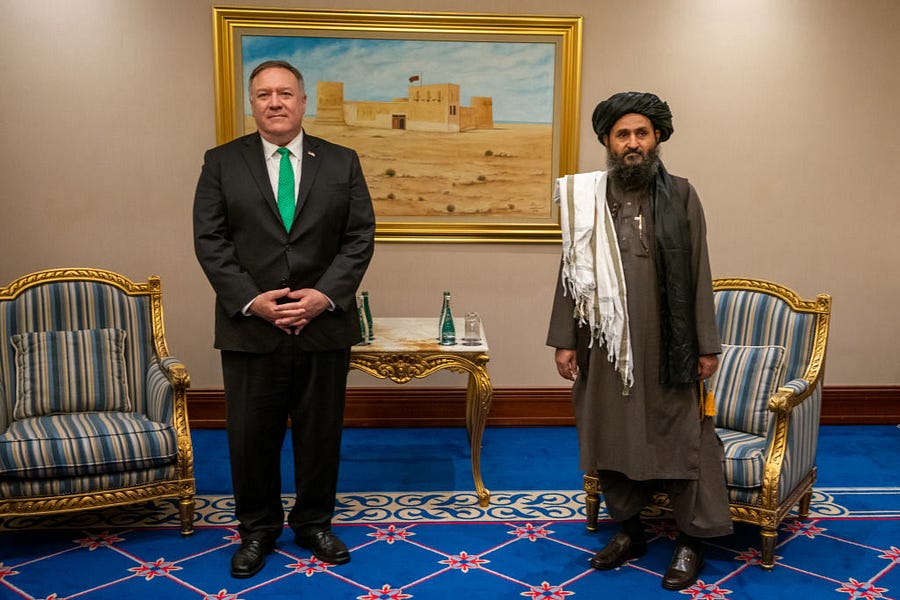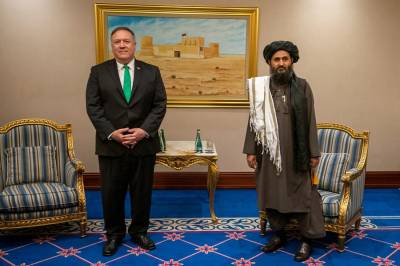This week, both the Senate Armed Services Committee (SASC) and the House Armed Services Committee (HASC) held hearings on the debacle in Afghanistan. The main witnesses were the three American generals who oversaw the chaotic withdrawal of American forces at the very end. Secretary of Defense Lloyd Austin, Chairman of the Joint Chiefs of Staff Gen. Mark Milley, and CENTCOM Commander Gen. Kenneth “Frank” McKenzie were all called to testify before the committees. I, too, was honored to testify before SASC on Thursday. You can read my written testimony here, if interested, and also watch a video of the session.
There are many lines of questioning I could focus on in this Vital Interests newsletter, but I’ll stick to just one. Many of the representatives and senators were worried about America’s ability to conduct so-called “over the horizon” counterterrorism operations, which are principally missile strikes from outside the theater of operation. America no longer has a footprint inside Afghanistan, so any attempt to go after al-Qaeda or Islamic State (ISIS) figures will be from an “over the horizon” posture.
I agree with many of the concerns that were expressed. America’s ability to collect intelligence on he ground has been severely hampered, if not eliminated entirely. Quite frankly, it wasn’t that great to begin with, as al-Qaeda’s presence inside Afghanistan was consistently underestimated.
Some claim that the U.S. can go after terrorists in Afghanistan just as it does in places such as Somalia, Syria, and Yemen. But Afghanistan is different. Unlike those three countries, it is landlocked. There aren’t nearby waterways to operate in. And the U.S. still hasn’t secured basing rights in any neighboring countries. Some of Afghanistan’s neighbors, such as Iran, are hostile to any American presence.
Another country neighboring Afghanistan, Pakistan, hosted and sponsored the Taliban for the past 20 years despite being America’s putative ally. The Pakistanis may not even allow the U.S. to use its airspace in the future. Even if Pakistan does relent, the Pakistani military and intelligence services are duplicitous. There’s a reason President Obama didn’t warn the Pakistanis that the Navy SEALs were coming in May 2011, when they hunted down Osama bin Laden in Abbottabad, Pakistan. The Obama administration was worried that the Pakistanis would tip off the al-Qaeda founder. According to bin Laden’s bodyguard, Nasser al-Bahri, the Pakistanis did just that in late August 1998, when they warned the al-Qaeda master that the U.S. was prepared to strike his camps in Afghanistan. Bin Laden lived to terrorize another day.
But there’s another problem with the over-the-horizon model that hasn’t received as much attention. Let me explain.
The three generals who testified this week all agreed that the bilateral withdrawal agreement between the Trump administration and the Taliban fatally undermined the government of Afghanistan. The generals came to this position only belatedly , however, as the U.S. military signed off on the whole phony peace process with the Taliban. From my perspective at the time, it was obvious that America’s negotiations with the Taliban were the beginning of the end for Kabul.
I don’t want to revisit all of that here, but I do want to isolate one additional problem with the Doha deal that the generals didn’t pick up on. The Taliban is using it to protect al-Qaeda. Here’s how.
Earlier this month, after Pentagon spokesman John Kirby refused to rule out airstrikes targeting Sirajuddin Haqqani and other members of the so-called Haqqani Network, the Taliban responded by arguing that such attacks would violate the Doha accord. On September 9, the Taliban released a statement titled, “Latest US position regarding blacklist is a violation of Doha Agreement.”
“Pentagon officials have remarked that some cabinet members of the Islamic Emirate or family members of [the] late Haqqani Sahib - may Allah be pleased with him - are on the US blacklists and still targets,” the statement’s opening line reads. “The Islamic Emirate considers this position a clear violation of the Doha Agreement which is neither in the interest of the United States nor Afghanistan.”
Haqqani Sahib is a reference to the late Jalaluddin Haqqani. He was the patriarch of the so-called Haqqani Network, which is an integral part of the Taliban. You can read my written testimony for a summary of the Haqqanis’ intimate, decades-long relationship with al-Qaeda. Jalaluddin protected and worked with Osama bin Laden. His son, Sirajuddin, remained one of al-Qaeda’s closest allies throughout the war in Afghanistan. He may even be a part of al-Qaeda’s own leadership. Either way, Sirajuddin is an al-Qaeda man. One of his lieutenants was even responsible for protecting Osama’s son, Hamza, who was killed a few years ago in a U.S. drone strike under murky circumstances.
There’s much more to the story, but the point is there’s no question the Haqqanis have been in bed with al-Qaeda since the 1980s. And now Sirajuddin Haqqani, who has been the Taliban’s deputy emir (or No. 2) since 2015, has also been named the interior minister of the Taliban’s regime. This gives Sirajuddin broad power to oversee the internal police state and security forces for the resurrected Islamic Emirate of Afghanistan. In his new role, Sirajuddin also has the power to protect his blood brothers in al-Qaeda. Other members of the so-called Haqqani Network are playing prominent roles in the Taliban’s Islamic Emirate as well.
The Taliban argues that the Doha agreement protects Sirajuddin, as well as all of the other Haqqanis who work with al-Qaeda.
In its September 9 statement, the Taliban (correctly) emphasized that the Haqqanis do “not have a separate name or organizational setup.” This was a response to claims made by State Department spokesman Ned Price and the Pentagon’s Kirby, both of whom tried to create some distance between the Haqqanis and the Taliban in the public’s mind. Price went so far as to claim the Haqqani Network and the Taliban are “separate entities,” which is false.
Not only does the Taliban reject Price’s argument, it goes further, pointing out that the Haqqanis were represented in the Doha negotiations and are, therefore, protected by its provisions. The U.S. agreed to review the U.N. sanctions against Taliban leaders, with the goal of removing them, once “intra-Afghan negotiations” began. The Taliban overthrew the government of Afghanistan instead, but the Taliban still argues that the sanctions should be lifted, including those targeting Sirajuddin Haqqani. Remember: Sirajuddin is a wanted terrorist with a $10 million bounty on his head.
The Doha agreement includes this troublesome passage:
“The United States and its allies will refrain from the threat or the use of force against the territorial integrity or political independence of Afghanistan or intervening in its domestic affairs.”
That passage could easily be read as a ban on any counterterrorism operations, over the horizon or otherwise. And this puts the Biden administration in a pickle. On the one hand, the administration says it wants to keep the terror threat in check with targeted airstrikes. On the other hand, the administration has acted as if the Doha agreement remains in effect.
But the Biden team can’t have it both ways, as the Taliban claims that same accord bans all American operations in Afghan airspace.
On September 29, the Taliban reiterated this argument in another statement titled, “About airspace of Afghanistan.” The Taliban claims that the U.S. continues to fly drones overhead, thereby “violating all international rights, law” and the U.S. “commitments to the Islamic Emirate in Doha, Qatar.”
“These violations must be rectified and prevented,” the Taliban argues, meaning the U.S. should no longer fly its drones in Afghan airspace.
During the hearings this week, Gen. Milley emphasized that the Taliban hasn’t severed its relationship with al-Qaeda. On that score, Milley is right. And this is another reason the Biden administration should declare the Doha deal null and void: the Taliban hasn’t lived up to a single counterterrorism provision within it, despite the previous administration’s claims.
The Trump team sold the Doha deal as a major counterterrorism success. Special Representative Zalmay Khalilzad repeatedly vouched for the Taliban’s counterterrorism assurances in the agreement. Secretary of State Mike Pompeo claimed that the Taliban “would work alongside of us to destroy, deny resources to and have al-Qaida depart from that place.”
“They will be killing terrorists,” Trump said of the Taliban after the Doha deal was signed. “They will be killing some very bad people. They will keep that fight going.”
Instead, the Taliban is using the Doha accord to protect the terrorists. Al-Qaeda couldn’t have hoped for a better outcome.






Please note that we at The Dispatch hold ourselves, our work, and our commenters to a higher standard than other places on the internet. We welcome comments that foster genuine debate or discussion—including comments critical of us or our work—but responses that include ad hominem attacks on fellow Dispatch members or are intended to stoke fear and anger may be moderated.
With your membership, you only have the ability to comment on The Morning Dispatch articles. Consider upgrading to join the conversation everywhere.